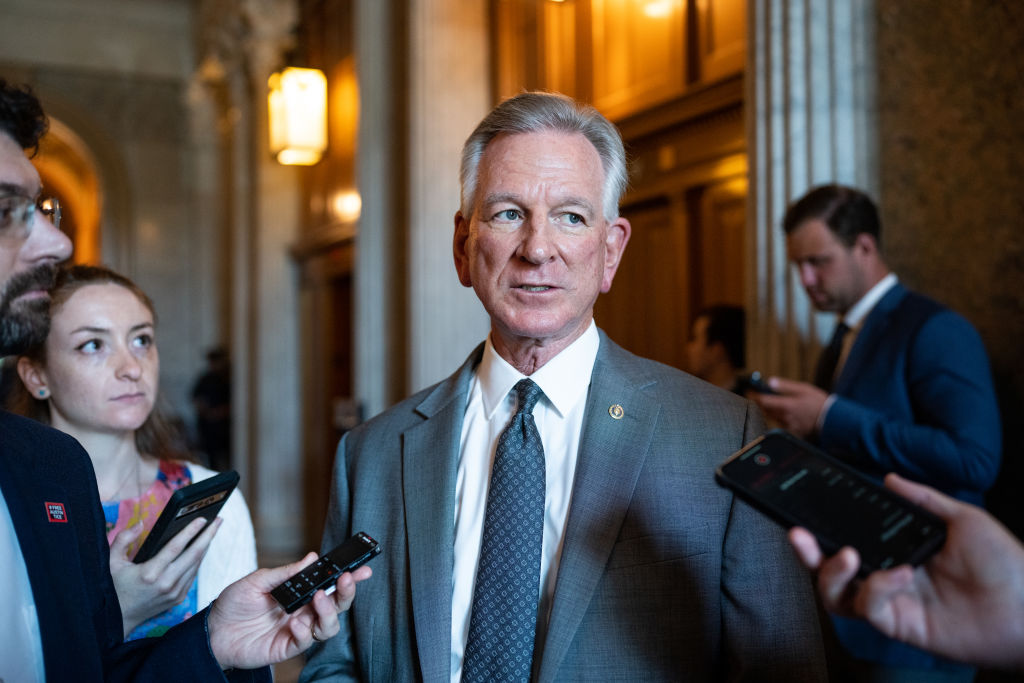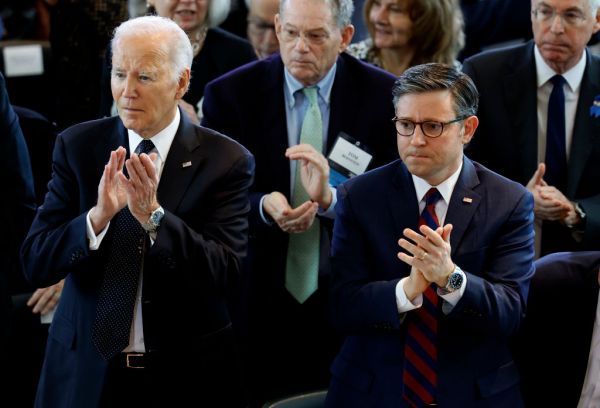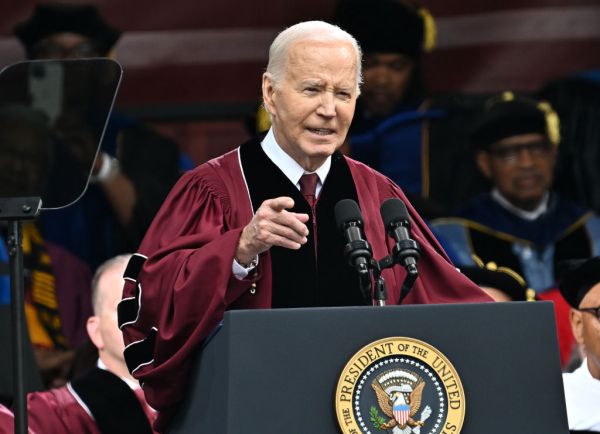Sen. Tommy Tuberville for months has been blocking military promotions and confirmations to protest Pentagon abortion policies. Senate Democrats and the White House have decried Tuberville’s tactics from the beginning, but now some of Tuberville’s GOP colleagues seem conflicted too.
Tuberville may achieve one of his goals: a vote forcing lawmakers to go on the record about codifying the policy. Senate Majority Leader Chuck Schumer said Wednesday that if Tuberville “wants to have an affirmative vote, we would not object to it.” It’s unclear whether a floor vote would dislodge his hold if the Pentagon didn’t reverse the policy.
“I’m getting to the point now where the next vote we have on these nominees is going to be after we vote on a bill that will codify what they’ve got,” Tuberville told reporters Thursday. “But we got to change the policy back first before we vote” on the nominees.
The policy at the center of the debate is the Pentagon’s October decision to give servicemembers paid leave and travel reimbursement to obtain abortions if they are stationed in a state that restricts abortion access.
Republicans argued the policy ran afoul of longstanding federal law prohibiting taxpayer dollars from paying for abortions. Enter Tuberville’s blanket blockade in February, taking advantage of a procedure allowing any senator to place a hold on a unanimous consent vote, stopping Senate leaders from fast-tracking approval for large slates of legislation or executive branch nominees.
About 260 Pentagon nominations and promotions have been in limbo since February, including the Marine Corps’ commandant. The Pentagon estimated the hold could affect up to 650 nominations by the year’s end.
Tuberville’s hold does not prevent lawmakers from approving each nominee individually, but that would take much more time.
“The idea that we should go through regular order and process these nominees—if we did it 24/7, it would still take many months,” Sen. Brian Schatz, a Democrat from Hawaii, told reporters Thursday. “If we start processing these nominees as if they’re a deputy secretary, this place will do only personnel, and we’ll do it poorly for the rest of the existence of the Senate.”
Senate Minority Leader Mitch McConnell in May came out against the tactic, but he hasn’t pressured Tuberville to change course and has deflected reporters’ questions.
North Carolina Sen. Thom Tillis tells The Dispatch of a trip to Lithuania in which he met a colonel who was up for a promotion to general but couldn’t advance because of the hold. Another Army officer asked Tillis, a Republican, and the bipartisan group of lawmakers on the trip to “help us overcome” Tuberville’s hold, Punchbowl News reported.
“No daylight between him and me on the policy that we oppose,” he said referring to the abortion policy. “But it’s just an example of people that are being swept up into it that I don’t think is just a good long term strategy.” He doesn’t believe the hold is harming national security at the moment, but it could if drawn out.
The Pentagon hasn’t backed down. In May, a group of former defense secretaries sent a letter to the Senate warning that the hold harmed “military readiness and risks damaging U.S. national security.” Military brass has also spoken on the issue, including Air Force Secretary Frank Kendall. The White House press shop—and sometimes President Joe Biden himself—has taken to criticizing Tuberville nearly every day.
“Holy smokes, if you let him, you know, negotiate this you open Pandora’s Box. Every social issue then gets dragged into the military,” Sen. John Hickenlooper, a Colorado Democrat says.
But nearly all of Tuberville’s GOP colleagues on Thursday defended his right to hold confirmations, as long-standing Senate tradition, and most were quick to say they agree with his underlying concerns about the policy.
“If they would just follow the law, none of this would be happening. I don’t know why they set a policy that violates the law,” Sen. Cynthia Lummis tells The Dispatch of the Pentagon’s policy.
“The best approach is that the Department of Defense, the administration, and Sen. Tuberville could come to a mutually acceptable alternative to the current status quo,” Sen. Mike Rounds of Indiana tells The Dispatch. “It does take the administration to recognize that maybe not everybody believes as they do that everything they did was perfect in this particular situation. Because clearly a lot of us think they really overstepped.”
Republicans in the House of Representatives have also taken aim at the Pentagon’s policy: Last week the House passed the National Defense Authorization Act (NDAA), an $886 billion defense bill that included an amendment rescinding the abortion policy. That and other measures in the bill cost the Republican majority nearly all Democratic support.
The Senate’s version of the NDAA is unlikely to include any of the hard-fought priorities conservatives won in the House, setting up what may be a tricky process when it comes to merging the two versions later in the year.
Sen. Joni Ernst, an Iowa Republican, has offered an amendment that would rescind the policy, but it’s unclear whether a vote to satisfy Tuberville would be for an amendment to the NDAA or a standalone measure.
Several Democrats told The Dispatch that while they don’t mind a vote on the issue, they remained skeptical it would be a solution. Several cast the stand-off as one Republicans needed to police on their own: “This is a Republican problem that has to be sorted by Republicans,” Schatz said. “There’s nothing we can do about it.”
Space Command Prompts (Another) Republican Hold
The Senate isn’t the only chamber stymying the Department of Defense. A House Republican is holding up DOD budget moves because of an argument over where the U.S. Space Command will be located.
The Defense Department can shift, or “reprogram,” billions of funds internally to cover budget shortfalls in certain areas but only with approval from the chairmen and ranking members of three congressional committees if the amount exceeds $10 million. Defense officials are waiting on several requests, including moving $108 million to its missile warning and satellite tracking program.
Rep. Mike Rogers, chairman of the House Armed Services Committee (HASC), is withholding his approval until the Air Force confirms whether it will move the U.S. Space Command to Redstone Arsenal Army Base in Rogers’ home state of Alabama. The command headquarters are currently located at Peterson Space Force Base in Colorado, but the Trump administration announced in January 2021 it would move headquarters to Alabama. Space Command oversees joint forces from several military branches for space-related military operations.
The Biden administration has put the relocation on hold, though a Government Accountability Office review found there was no fault with the Trump administration’s decision.
“All the Air Force has got to do is make an announcement,” Rogers told Military.com. “I don’t care what the announcement is. Make an announcement. They’ve had 13 months since the inspector general finished reviewing it and said there was no political interference. Make an announcement.”
He seemed to soften his approach this week—he approved several Pentagon budget reprogramming requests affecting troop pay after the Air Force suspended some bonuses. But he is still blocking other reprogramming requests, he told Defense News Wednesday, until the Air Force makes their decision.
Rogers’ hold is reportedly preventing Air Force members and families from relocating to new duty stations and had delayed enlistment bonuses and a college loan repayment program—all of which could hurt recruiting and exacerbate personnel shortages.
A group of Democratic lawmakers from Colorado slammed the hold as “legislative hostage-taking.” Members of the Centennial State’s delegation have been lobbying to keep the base in their state, Military.com reported.
The Air Force has not publicly announced what is causing the delay. In March, Secretary Frank Kendall told lawmakers that the department was still in the process of reviewing the location and had not made a recommendation or a decision. Kendall listed “operational capacity and mission performance” as one of the hold-ups.
“We should be making the decision based on the merits of the location and not based on the politics of the members,” Rep. Seth Moulton, a Massachusetts Democrat on HASC, tells The Dispatch.
Republicans on the committee blame the Pentagon.
“Relitigating this isn’t good for the Space Force,” Rep. Don Bacon, tells The Dispatch. “I don’t think it’s wise to overturn decisions once formally made.”
What’s Next for Republicans’ Biden Family Investigation?
In their ongoing investigation of Hunter Biden and payments made to the Biden family, congressional Republicans may next look to call in the prosecutor leading the Justice Department’s probe into the president’s son.
IRS Special Agents Gary Shapley and Joe Ziegler appeared before the House Oversight Committee Wednesday with the message that they believe Hunter Biden received special treatment from federal investigators probing his tax payments.
Both claimed prosecutors and investigators said Biden should have been charged with a felony. Last month federal prosecutors and Biden reached a deal for him to plead guilty to misdemeanor two tax crimes and admit to owning a gun illegally.
In a hearing that sometimes turned obscene, Democrats didn’t question the witnesses’ credibility but argued the U.S. attorney’s decision on Biden’s charges was an example of prosecutorial discretion and that differences between the IRS agents and their superiors could be chalked up to misunderstandings.
One of the points of disagreement was Shapley’s claim that U.S. Attorney David Weiss said he could not file charges in jurisdictions other than in Delaware. Weiss has disputed that and other claims.
“We need to be talking to U.S. Attorney Weiss,” Rep. Byron Donalds, a member of the committee, tells The Dispatch. “Weiss and his deputy need to answer some serious questions.”
He believes the findings are building a case for impeaching Attorney General Merrick Garland. “What we’ve heard from Merrick Garland, which was short, does not line up with what the investigative team and IRS is saying,” Donalds said. “So somebody’s lying.”
On Thursday, Republican Sen. Chuck Grassley also released a copy of a tip to the FBI alleging a scheme to bribe President Biden. The unverified tip on an FD-1023 form alleges that while then-Vice President Joe Biden was carrying out the Obama administration’s policies on Ukraine, Ukrainian business leaders thought having Hunter Biden on their board would inculcate it from a wider crackdown on corruption. The FBI informant who provided secondhand information for the tip claimed that Burisma CEO Mykola Zlochevsky thought sending millions to both the senior Biden and his son would also help his company. The CEO also claimed to have recordings and text messages to back up his claims.
The claims in the tip “have reportedly been scrutinized by the Trump Justice Department, a Trump-appointed U.S. attorney, and a full impeachment trial of the former President that centered on these very issues, and over and over again, they have been found to lack credibility,” White House spokesperson Ian Sams said.








